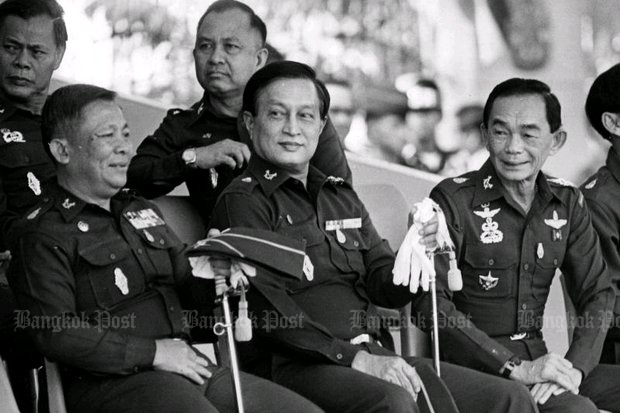
Army chief Apirat Kongsompong's harsh reaction to the idea of politicians who want to push for military reform has triggered a number of questions.
His reference to Nak Phandin, a song from the 1970s that has been used as patriotic propaganda, and which has caused a stir at a time when the country is inching its way back to democracy.
Does this mean the military regime's unity and reconciliation process, the main reason for its decision to intervene in politics with a coup in 2014, has gone astray? The comment has certainly raised eyebrows as it suggests the leader of the Thai army views the public as the "enemy".

Ploenpote Atthakor is editorial pages editor, Bangkok Post.
Or is it just that no one cares about national reconciliation anymore? Should we start to worry about post-election conflicts?
But there is more to this than just the name of the song, which loosely translates as "Burden on the Land", the content of which has been used to stir up hatred and divisiveness across the country.
It is also about how his military subordinates responded. After the army chief referred to the song when answering reporters' questions about proposed military budget cuts and plans to scrap mandatory conscription by two political parties, over 120 military radio stations promptly played it, alternating it with the Army's March. This musical fiasco did not last long, though.
But it has raised another important question: Why does the military still own radio stations? What happened to the country's telecom industry reform? Who wins and who loses when the military controls the radio?
Not to mention the fact that the military-owned radio stations' playing of this propaganda song brought back painful memories for many people.
It is closely associated with a massacre of students activists in 1976 when ultra right-wing leaders took control of the country -- one of the darkest chapters in Thai history.
I'm not sure if Gen Apirat is aware of this but he has reopened historical wounds the Thai elite want to forget.
As a result, many skeletons have been brought out of the closet and posted on social media, including certain bones of contention relating to Gen Apirat's family in former times.
He is the son of the late Sunthorn Kongsompong, a former supreme commander who in 1991 led his brothers in arms to topple the Chatichai Choonhavan government via another coup in 1991.
The regime, known as the National Peace Keeping Council (NPKC), used force against those who dared to challenge it in May 1992. Ultimately, its leaders were forced to step down in disgrace.
Gen Apirat needs to understand why the public thinks that increasing the army's budget during the tenure of Prayut Chan-o-cha is abnormal.
First, the regime's decision-making process can hardly be called transparent or accountable. This reminded many of a shameful statement made by one military personnel, who said that "only when the military runs the country can the submarines be procured". So true. Even elected governments, with their huge parliamentary mandate, for example the Shinawatra siblings, did not dare to make such a contentious purchase.
I don't think I need to elaborate much on the mandatory conscription issue. Gen Apirat should not forget how some young conscripts have fallen prey to brutal acts by their commanders or superiors.
Indeed, the public expects the powerful army chief to clean up the military's image and modernise the army, rather than issuing a threat with a song that is nearly half a century old.
As mentioned above, his reaction reignited memories of that bloodbath in 1976, which until now, remains a difficult topic to discuss in Thailand, a taboo of sorts.
Of course, this opens up a whole new can of worms.
For example, why can we not openly discuss this topic after 43 years have passed? Why does any content that refers to the Oct 6 killings, for example a scene in a movie, have to be banned or censored?
On top of that, isn't it about time this sensitive issue was dealt with properly, which means open debate.
If we straighten out the past, maybe we can learn from it, and avoid making the same mistakes again and again.
